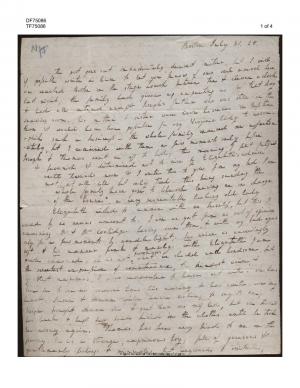Ellen W. Randolph Coolidge to Martha Jefferson Randolph
| Boston July 31. 25. |
The post goes out immediately, dearest mother, but I will if possible write a line to let you know of our safe arrival here. we reached Boston in the stage coach between ten & eleven o clock last night; the family had given up expecting us for that day & had all retired except Joseph’s father who was still in the drawing room. his mother & sister were down however in less time than it would have been possible for any Virginia lady to accomplish such a business—the whole family received me affectionately, but I remained with them a few moments only before Joseph & Thomas sent me off to bed; this morning I felt fatigued & feverish & determined not to rise by Elizabeth’s advice until towards noon, & I write this to you from my bed; I am not at all ill but only tired. this being sunday the whole family have gone to Church leaving me in charge of the “bonne” a very respectable looking old lady. Elizabeth wished to remain with me herself, but this I would by no means consent to. I can as yet form no sort of opinion concerning Mr & Mrs Coolidge having seen them, & with my bad eyes only for a few moments by candle-light; her voice is exceedingly soft & his manner frank & manly. with Elizabeth I am quite charmed; she is not perhaps what we should call handsome, but the sweetest expression of countenance, the kindest voice, & gentlest manners, I ever remember to have met with. she has been in to see me several times this morning & has quite won my heart. Susan & Anna will have nothing to say to me; Joseph brought Anna in & put her on my bed, but she turned her back & kept her head buried in the clothes until he took her away again. Thomas has been very kind to me on the journey. he is a strange, capricious boy; full of generous & gentlemanly feelings & principles, but wayward & irritable; quite a spoiled child.—he will make an excellent husband for he is good hearted & good-tempered, & his faults are nothing in comparison with his virtues. I do not think he is fond of me, but he treats me kindly, for & seems anxious that I should be well accommodated. I found here a letter from you of the 14. & one from Cornelia of the 13. these have made me very uneasy on my dear grand father’s account & I shall feel low-spirited until I hear again. do not leave him, my dearest mother; no possible claim which Elizabeth can have on you, can stand for a second in comparison with his health & happiness. I think the Ashton family are exorbitant in their demands whenever they would sacrifice his comfort & peace of mind to any personal or selfish considerations. I would [. . .] drain the blood from my own heart to pay our pecuniary obligations there, but I would not diminish my grandfather’s few pleasures old & sick & sad as he is, not to clear the debts of the congregated world, nor repay any earthly obligation which we can owe to any earthly being. I can scarcely forgive Francis for nor any of the rest of them for their extravagant demands on your time & attention. but enough—this is a subject which excites unkindly feeling, & I wish to have none such towards any I have left behind me; only I cannot help thinking that domestic love itself may be carried too far where it instigates us to sacrifice the good of others to selfish considerations for their the our objects of attachment. of your presence could not have been necessary at Ashton, & it was necessary at Monticello, & the fever into which Elizabeth had been cooked, was a poor excuse for dragging you from your sick & aged father, at a time when your presence was so essental to him. I cannot banish his image from my mind, as I have often seen him feeble & suffering,—but my indignation & sorrow rise as I give vent to them, and as I really & truly love my Aunt & her family, I will be silent on this ungrateful subject—do not mistake me, dearest mother, or suppose I mean in the least to censure you! no you sacrificed your own wishes to your sense of right; but they who exacted this sacrifice are surely to blame.—we received three letters from you in New York, & one I one from each of the girls; I have written twice a piece to each of them and repeatedly to you. as soon as I have time I shall write to my dearest grandfather, to Jane [Ho]llins & Maria Woodward. thank my dear C— for her [sec]ond letter to which I will reply as soon as I can. [Jos]eph is at church—it is the first time I have been separated so long from him, & tired as I am of travelling, weary & worn [. . .] & sighing for rest, I cannot help regretting that I can no longer expect to live in his presence as I have done for some time past. he has been so above the little shame of being too attentive to his wife, that neither in public nor in private has he ever for more than ten minutes quitted my side. he has set by me at table, lifted me in & out of every carriage or steam boat in which I have entered, escorted me to, my chamber whenever I retired to it, & been all to me that heart or fancy could wish. love to all my dear ones. Mrs Nichols hurries me with my letter & I have inked the sheet all over. adieu my own beloved mother—ever your own
